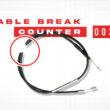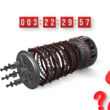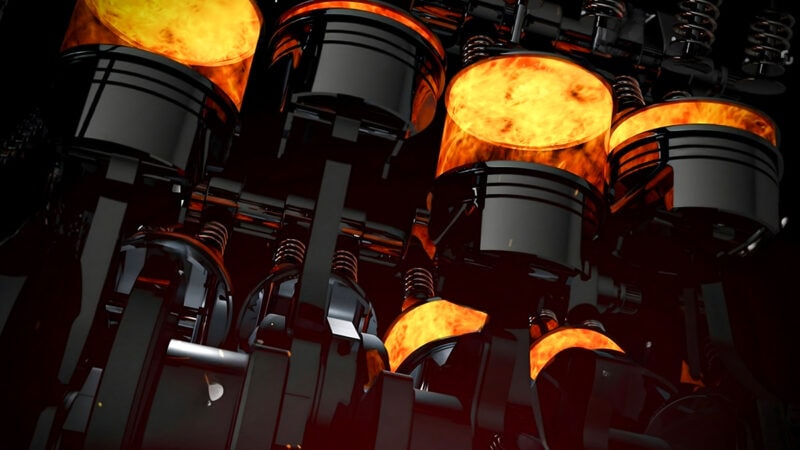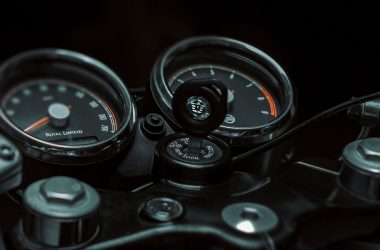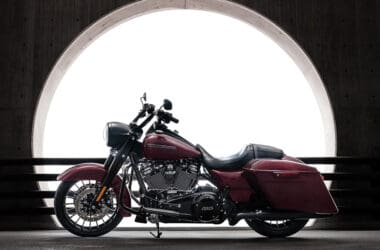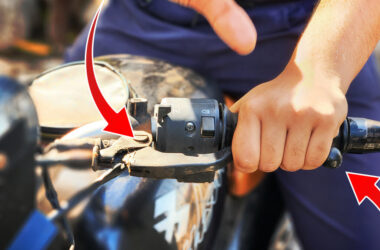Everyone loves the sound of their motorcycle revving, but the joy can turn into a serious concern if you hear your motorcycle engine knocking.
Engine knocking is harmful to the motorcycle’s performance, internal components(parts), and overall life and integrity of the engine itself. The engine knocking should be fixed as soon as possible.
Engine knocking occurs when there is an uneven combustion process inside the combustion chamber of the engine, which causes the self-ignition of some unburned air/fuel mixture in an untimely manner due to high engine temperature resulting in the engine knocking noise. Ignoring this noise from the engine and continuing to ride will cause serious engine damage.
In this article we will go through all the major aspects behind engine knocking and what it does to the motorcycle engine. We will also discuss the causes/reasons behind the knock and how to stop and prevent engine knocking.
Now you don’t have to panic and think about the worst possible damage to the engine, as it can be prevented by some neat maintenance routine from time to time.
Table of Contents: (Click To Go To The Desired Section Of This Article)
What Is Engine Knocking In Motorcycle?
Before knowing what harm engine knocking can do to your motorcycle, first you should know what engine knocking is.
Engine knocking is when the small pockets of unburned air/fuel mixture get ignited/exploded outside the reach of the spark plug’s flame front, this causes multiple explosions of these pockets of air/fuel mixture resulting in a Knocking sound.
When your motorcycle burns the air/fuel mixture inside the combustion chamber whether it be a 2-stroke or 4-stroke motorcycle, the piston is at the Top dead center (TDC) (the top part of a piston stroke).
The air/fuel mixture is completely compressed and gets ignited by a spark plug’s flame front where it will get burned/explode smoothly and gradually all at once.
Multiple random spontaneous explosions/burning of this air/fuel mixture causes that knocking/pinging noise.
Why Does Motorcycle Make A Knocking Noise?
Uneven burning of air/fuel mixture which should get burned/exploded all at once rather than multiple mini-explosions causes an untimely combustion process (a.k.a that knocking sound).
The engine knock sound changes the revving sound of the motorcycle, where you will hear that untimely/uneven explosion of air/fuel mixture (engine knock sound) when your motorcycle is accelerating or at idle.
Engine knocking should not be confused with pre-ignition/premature detonation though it will have the same result of pinging/knock noise, but the damage from it will vary.
We will discuss about pre-ignition and how it ties in with engine knocking later in this article.
Physical damage to the connecting rod, crankshaft bearings, or crankshaft itself will create an engine knocking noise/sound.
So now you know what engine knocking is and how it sounds, we will look into what are the major causes/reasons for engine knocking to occur in a motorcycle.
What Causes/Reasons For Motorcycle Engine Knocking?
So we will look into each cause/reason for motorcycle engine knocking in brief detail and the damage it can do to the moving parts of the engine (pistons, valves, connecting rod, crankshaft).
1. Pre-ignition/Premature Detonation Causes Engine Knocking

For a motorcycle to burn the air/fuel mixture it must be fully compressed in the combustion chamber before it gets ignited by a spark plug. To achieve that full compression state, the piston should reach the top part of the stroke also known as the Top dead center (TDC).
Pre-ignition is an event where some of the air/fuel mixtures in the combustion chamber get exploded/burned without a spark plug’s flame front and optimal compression state where the piston is not at its TDC.
This badly timed/uneven burning of air/fuel mixture can cause multiple mini-explosions even after the spark plug ignites the leftover air/fuel mixture.
This causes that engine knocking noise from the motorcycle engine. The shockwave from the explosion of the air/fuel mixture in the pre-ignition event acts as an opposing force to the piston’s upward motion/stroke, this can bend the connecting rod or cause a hole in the piston’s crown (topmost flat surface)
Pre-ignition can be caused by overheating, lean mixture, and carbon buildup which we will discuss next.
2. Lower Octane Fuel Will Cause Engine Knock

So each motorcycle manufacturer recommended a specific number of octane fuel for their motorcycle to function and run properly.
Lower octane fuel which is not compatible with your motorcycle engine will burn spontaneously even before its fully compressed by the pistons, which builds up high pressure inside the engine and creates engine knocking noise.
Lower octane fuel has a low tolerance to a high amount of compression, which causes the air/fuel mixture to ignite way earlier before it’s fully compressed by the pistons.
This buildup of pressure inside the combustion chamber and uneven combustion process causes an engine knocking sound.
And as we discussed earlier the air/fuel mixture should be only ignited by the spark plug and at the fully compressed state where the piston is at its TDC.
3. Misfiring Or Worn Spark Plugs Cause Engine Knocking Sound
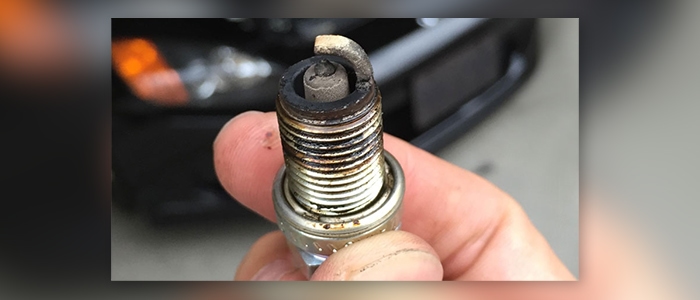
Spark plugs are timed by the motorcycle’s ignition system to ignite the air/fuel mixture when it’s fully compressed.
Worn-out spark plugs that have an electrode wear/breakage, corrosion, or breakage of ignition tip will misfire or won’t work effectively to ignite the fuel in the combustion chamber.
This ineffective way of igniting the air/fuel mixture will cause uneven combustion and bad spark plug timing, which will cause engine knocking noise from the motorcycle.
4. Carbon Deposit Buildup In Combustion Chamber Is A Reason For Engine Knocking
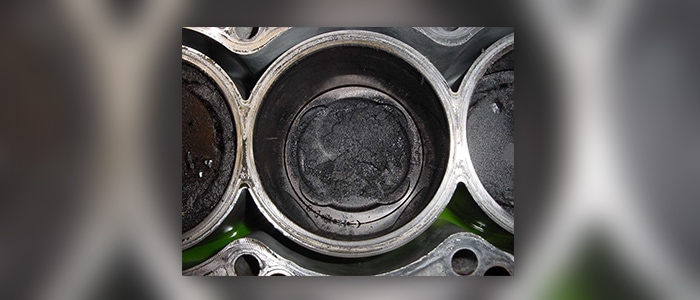
Carbon Deposits will build up inside the combustion chamber and cylinder due to incomplete fuel combustion. Low-octane fuel is one of the major reasons for the formation of carbon deposits and lack of maintenance plays a key role too.
During the compression of air/fuel mixture inside the chamber, the temperature of the engine is hot and can overheat due to the carbon deposit too.
So the buildup of carbon inside the cylinder and combustion chamber will heat up once the engine temperature rises, which will prematurely ignite the air/fuel mixture before its completely compressed resulting in an engine knock noise.
5. Worn Crankshaft Bearings Cause Engine Knocking Noise
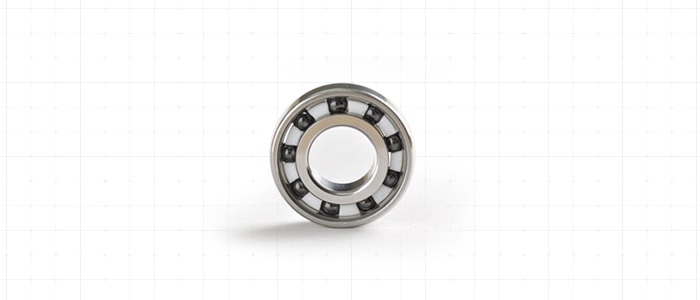
Worn out crankshaft bearing can cause rough movement in the connecting rod and crankshaft.
This can also increase heat and pressure due to metal-to-metal contact and will cause distortion to the connecting rod and crankshaft.
So the rough and inefficient movement of the crankshaft and connecting rod caused by worn bearings will result in an engine knocking noise.
Is Engine Knocking Serious & What Damage It Can Do?
Engine knocking is a serious occurrence where it can cause major damage to the engine where it can seize or can result in permanent wear to internal components of the engine. Damage to the cylinder wall, pistons, connecting rod, or crankshaft will occur due to the uneven combustion process which can be heard as a knocking noise.
The uneven combustion process will cause multiple spontaneous explosions of the air\fuel mixture. This will work as an opposing force to the piston’s movement which can cause a bend to the connecting rod & bearings.
The friction inside the cylinder will increase due to the high pressure created by the even combustion process.
Physical damage to the internal moving parts of the engine at this point is imminent.
How To Stop Motorcycle Engine Knocking?
To stop a motorcycle engine from knocking one have to check the conditions of the spark plugs to look for any damages and should opt for a high octane fuel or recommended one for your motorcycle and tune a balanced air/fuel ratio if necessary.
If there is no permanent damage to the internal parts of the engine and you have just recently started hearing engine knocking noise, then using these solutions will definitely stop the knocking sound.
You should also check the air/fuel mixture ratio, where the motorcycle might be running a lean mixture (low fuel/more air).
The combustion process will be not efficient due to low fuel supply and high engine temperature and pressure will cause engine knock, so tune the carburetor or fuel injection system to balance the air/fuel ratio.
And it’s always better to run a little rich mixture as it’s safer for your engine.
Permanent damage to the cylinder wall, pistons, connecting rod, crankshaft, or crankshaft bearings will need replacement as soon as possible to avoid any further damage.
How To Prevent Motorcycle Engine Knocking?
To prevent motorcycle engine knocking, implement a holistic maintenance routine where engine oil, coolant(anti-freeze), and oil filter are replaced after they lose their efficacy. Using recommended or high octane fuel will also help to avoid the buildup of carbon inside the combustion chamber which can cause multiple detonations in the form of engine knocking or pre-ignition once the engine temperature rises.
Overheating of the engine is one of the major reasons behind engine knocking.
So using good quality engine oil and coolant to regulate engine temperature is mandatory, and you should change engine oil every 5,000-6,000 miles/8,000-9,500 Kilometers or (Once a year).
Checking spark plugs to see if they are in proper condition is very necessary, as you will need an ignition source to burn the air/fuel inside the engine to make your motorcycle run.
So replace spark plugs if they are extremely corroded or have any damage to the electrode to the ignition tip of it.
But keep in mind that a well-maintained motorcycle that has a proper maintenance routine will keep the engine components in good condition and will prevent engine knocking.
Motorcycle Engine Knocking FAQs
Motorcycle Engine Noise When Accelerating?
Motorcycle engine noise when accelerating (high rpm) is often related to worn out/damaged connecting rod, crankshaft, or it’s bearings.
Motorcycle Engine Knocking Noise At Idle?
Motorcycle engine knocking noise at idle (low rpm) is caused due to uneven combustion process or inadequate fuel supply to the combustion chamber to get burned, which can be due to a wrong air/fuel mixture ratio.
How Do I Know If My Engine Is Knocking?
You will hear a metallic pinging or knock/detonation sound, which can be easily heard during acceleration or at an idle state.
How Long Can Engine Knock Last?
Engine knock can last until the internal components are severely damaged where the engine might seize. So take it to the professional mechanic for a much needed engine service.
2 Stroke Knocking Sound?
2-stroke motorcycles such as dirt bikes/pit bikes will have a knocking sound due to crankshaft, connecting rod, or crank bearings damage. An uneven combustion process due to carbon buildup will also cause an engine knocking sound.


